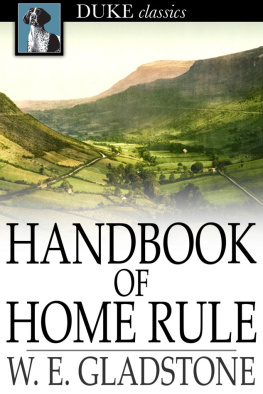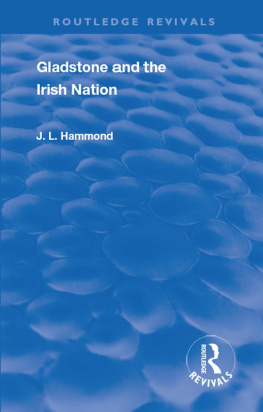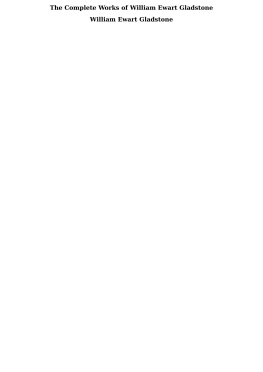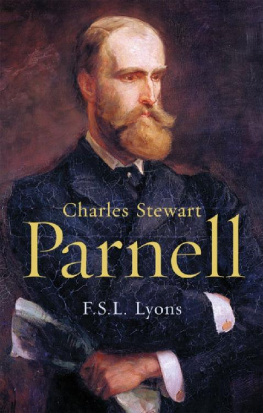HANDBOOK OF HOME RULE
* * *
W. E. GLADSTONE
ET AL.
Edited by
JAMES BRYCE
*
Handbook of Home Rule
First published in 1887
ISBN 978-1-62013-899-1
Duke Classics
2014 Duke Classics and its licensors. All rights reserved.
While every effort has been used to ensure the accuracy and reliability of the information contained in this edition, Duke Classics does not assume liability or responsibility for any errors or omissions in this book. Duke Classics does not accept responsibility for loss suffered as a result of reliance upon the accuracy or currency of information contained in this book.
Contents
*
Editor's Note
*
Of the articles contained in this volume, those by Mr. Gladstone, Mr.E.L. Godkin on "A Lawyer's Objections to Home Rule," and Mr. BarryO'Brien appear for the first time. The others are reprinted from theContemporary Review, the Nineteenth Century, and the New PrincetonReview, to the proprietors and editors of which periodicalsrespectively the thanks of the several writers and of the editor aretendered. In most of these reprints some passages of transitory interesthave been omitted, and some few additions have been made.
The object of the writers has been to treat the difficult questionsconnected with the Government of Ireland in a dispassionate spirit; andthe volume is offered to the public in the hope that it may, at a timeof warm controversy over passing events, help to lead thoughtful menback to the consideration of the principles which underlie thosequestions, and which it seeks to elucidate by calm discussion and byreferences to history.
October, 1887.
Preface by The Right Hon. Earl Spencer, K.G.
*
The present seems an excellent moment for bringing forward the argumentsin favour of a new policy for Ireland, which are to be found in thearticles contained in this volume.
We are realizing the first results of the verdict given at the electionof 1886. And this I interpret as saying that the constituencies were notthen ready to depart from the lines of policy which, up to last year,nearly all politicians of both parties in Parliament had laid down fortheir guidance in Irish affairs.
We have had the Session occupied almost wholly with Lord Salisbury'sproposals for strengthening the power of the central Government tomaintain law and order in Ireland, and for dealing with the mostpressing necessities of the Land question in that country.
It is well, before the policy of the Government is practically tested,that the views of thoughtful men holding different opinions should beclearly set forth, not in the shape of polemical speeches, but inmeasured articles which specially appeal to those who have not hithertojoined the fighting ranks of either side, and who are sure to intervenewith great force at the next election, when the Irish question is againsubmitted to the constituencies.
I feel that I can add little or nothing to the weight of the argumentscontained in these papers, but I should like to give some reasons why Iearnestly hope that they will receive careful consideration.
The writers have endeavoured to approach their work with impartiality,and to free themselves from those prejudices which make it difficult forEnglishmen to discuss Irish questions in a fresh and independent trainof thought, and realize how widely Irish customs, laws, traditions, andsentiments differ from our own.
We are apt to think that what has worked well here will work well inIreland; that Irishmen who differ from us are unreasonable; and thattheir proposals for change must be mistaken. We do not make allowancefor the soreness of feeling prevailing among men who have long objectedto the system by which Ireland has been governed, and who find thattheir earnest appeals for reform have been, until recent times,contemptuously disregarded by English politicians. Time after timemoderate counsels have been rejected until too late. Acts of anexceptional character intended to secure law and order have been verynumerous, and every one of them has caused fresh irritation; whileremedial measures have been given in a manner which has not won thesympathy of the people, because they have not been the work of the Irishthemselves, and have not been prepared in their own way.
Parliament seems during the past Session to have fallen into the sameerror. By the power of an English majority, measures have been passedwhich are vehemently opposed by the political leaders and the majorityof the Irish nation, and which are only agreeable to a small minority inIreland. This action can only succeed if the Irish can be persuaded torelinquish the national sentiments of Home Rule; and yet this was neverstronger or more vigorous than at the present time. It is supported bymillions of Irish settled in America and in Australia; and here I wouldsay that it has often struck me that the strong feeling ofdissatisfaction, or, I might say, of disaffection, among the Irish isfed and nurtured by the marked contrast existing between the socialcondition of large numbers of the Irish in the South and West of Irelandand the views and habits of their numerous relatives in the UnitedStates.
The social condition of many parts of Ireland is as backward, or perhapsmore backward, than the condition of the rural population of England atthe end of last or the beginning of this century. The Irish peasantrystill live in poor hovels, often in the same room with animals; theyhave few modern comforts; and yet they are in close communication withthose who live at ease in the cities and farms of the United States.They are also imbued with all the advanced political notions of theAmerican Republic, and are sufficiently educated to read the latestpolitical doctrines in the Press which circulates among them. Theirsocial condition at home is a hundred years behind their state ofpolitical and mental culture. They naturally contrast the misery of manyIrish peasants with the position of their relatives in the New World.This cannot but embitter their views against English rulers, andstrengthen their leaning to national sentiments. Their nationalaspirations have never died out since 1782. They have taken variousforms; but if the movements arising from them have been put down, freshmovements have constantly sprung up. The Press has grown into an immensepower, and its influences have all been used to strengthen the zeal forIrish nationality, while, at the same time, the success of the nationalmovements in Italy, Hungary, Greece, and Germany have had the sameeffect. Lastly, the sentiment of Home Rule has gained the sympathy oflarge bodies of electors in the constituencies of Great Britain, and,under the circumstances, it is difficult to suppose that, even if thecountry remains quiet, constitutional agitation will vanish or the Irishrelinquish their most cherished ambition.
We hear, from men who ought to know something of Ireland, that if theLand question is once settled, and dual ownership practically abolished,the tenants will be satisfied, and the movement for Home Rule will nolonger find active support in Ireland. Without going into the whole ofthis argument, I should like to say two things: first, that I do notknow how a large scheme of Land Purchase can be carried throughParliament with safety to Imperial interests without establishing, atthe same time, some strong Irish Government in Dublin to act between theImperial Government and the tenants of Ireland; and, second, that thefeeling for Home Rule has a vitality of its own which will survive theLand question, even if independently settled.







